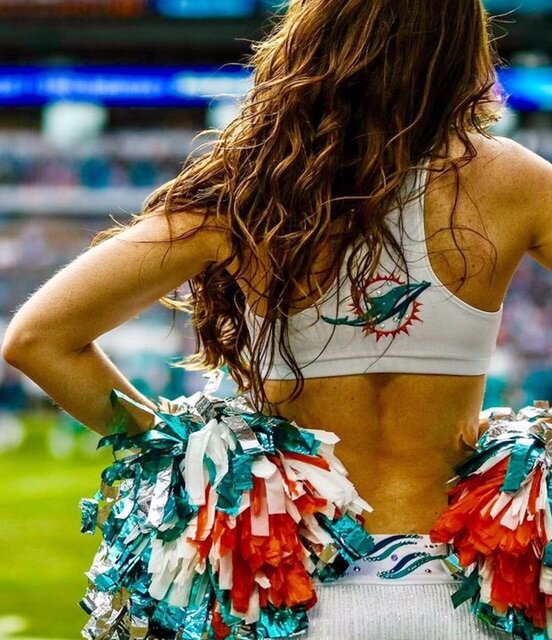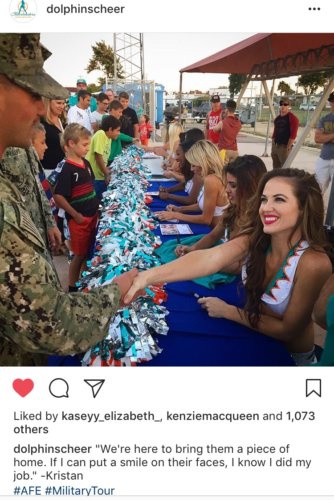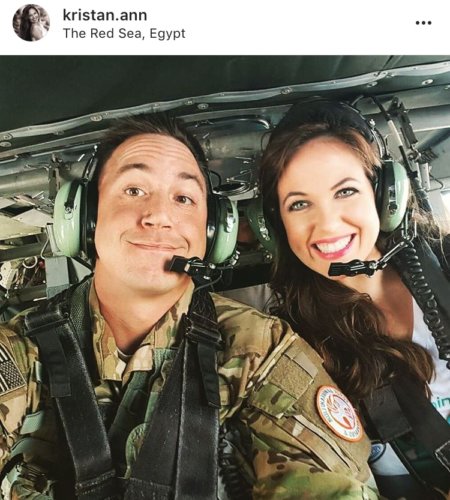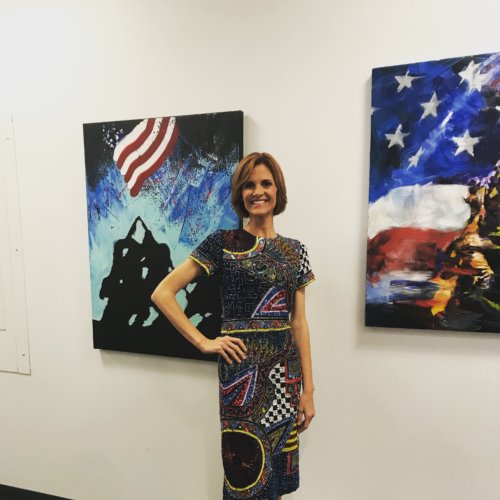
Football players can make as much as $28 million a year in the NFL. Bailey Davis—who was recently fired from her job as a New Orleans Saints cheerleader for posting a picture of herself on her Instagram account—started her job at minimum wage, which is $7.25 an hour in Louisiana.
Yeah, $7.25 an hour.
Saints cheerleaders, known as the Saintsations, are required to practice twice a week, perform on game days, and do a minimum of 10 appearances a year. Hourly rates for the Saintsations go up a dollar every year, says Davis, age 22, who is now suing for discrimination. “We’re not paid for travel time to games or practices and I was coming from Mississippi so it was a two hour drive there every time,” she clarifies.
Davis wasn’t in cheerleading for the money, clearly. She was in it for love. Her mother worked for the Saintsations for 18 years, and Davis grew up going to practices with her. “My family were big Saints fans. I always knew I wanted to be a Saintsation,” she says.
The Saintsations are required to wear a two piece midriff-baring gold and black uniform with a short skirt, typical for NFL cheerleading squads despite the frosty temperatures some must endure on the field. Yet Davis was terminated for posting an Instagram picture of herself in January, wearing a black lace bodysuit that covered her midriff. The mind reels at the logic there. One of the comments on her Instagram account reads: “Victoria’s Secrets posters up at the mall are more scandalous.”
Four days before she posted the photo, Davis was called into Human Resources. “They told me that I was seen partying with a player, and that there was rumors that I was messaging players,” she said (there are rules that prohibit cheerleaders from interacting with players). “Players message us all the time; it’s just part of the job. We’re used to that happening; we just don’t respond. And instead of saying, ‘Okay we’ll talk to the players,’ they said, ‘Is your Instagram private?’ And I said, no. And then they decided that all the girls needed to have their Instagram private so the players couldn’t find us.”
After Davis posted the picture, her coach texted her. “She said it was very poor judgment considering the rumors going around about me,” Davis says. “I was asked to resign, and I refused because I didn’t think I’d done anything wrong.”
Davis requested a meeting with human resources. “He immediately fired me as soon as I sat down, and said that it was a distasteful photo and it made me seem guilty of the rumors going around about me.” But the rules about private Instagram accounts and posting in underwear were only for the cheerleaders. “The players don’t have any of these rules,” says Davis. “If I were in a restaurant or movie theater and a player walked in from any NFL team I would have to get up and leave.” That actually did happen to her.
Former Miami Dolphins cheerleader Kristan Ann Ware started cheering in elementary school. “It wasn’t serious to me until I got to high school,” she said. “That’s when I really started to love cheerleading and also dance. But I actually grew up more of an athlete, so I played basketball, and softball, and all those contact sports that I loved.” Ware got a scholarship to play basketball at Columbia University and turned it down so she could cheer in college.
“I loved just being able to see the fans smile,” says Ware. “Nothing else matters for that one minute routine. All my problems or anything that was going on in school just went away. I think it’s a very beautiful thing for girls to express themselves that way.”
Ware cheered during her freshman year of college. She then transferred to the University of South Carolina, where she focused on completing her degree in marine science. Later, she auditioned to cheer for the Miami Dolphins. “I wanted to challenge myself,” she remembers. “I didn’t tell anybody except my parents and my best friend, and I booked a hotel room in Miami, and then I just auditioned for the experience, not thinking that I would make it.” When she made the team, she was so unprepared, she didn’t even have a place to live.
One aspect of the job that Ware enjoyed was making appearances for the military, since she grew up in a military family. “I got to travel to so many countries saying thank you to the men and women overseas in the military and that meant everything to me.”

Ware is a devout Christian. She is also a virgin who plans to wait until she is married to have sex. She wears a “True Love Waits” ring, which signifies abstinence before marriage. This did not sit well with the leadership. “At the beginning of my third year, my director and my coaches brought up my virginity,” she recalls. “They told me that sex was once upon a time pure and beautiful, but that I made it dirty. I started tearing up. They told me that I was too sensitive and too emotional and that they were helping me develop into a woman. And then I had to change into a bikini, trying to kind of hold in my tears, and I just felt really exposed.”
Why did she have to change into a bikini, you ask? “They wanted to take pictures of us to see if we were calendar ready.” Although that should have already been pretty clear, since the uniforms are basically turquoise bikinis. At the calendar shoot, says Ware, “the director came up to me and told me to grab the fruit basket and take the apples out and play with them like they are balls. I was embarrassed and I thought that I was being tested to see if I would laugh, so I just acted like I didn’t hear the comment. You’re just supposed to stand there with a smile. You can never not be smiling, so no matter what happens to you, even if you’re crying, you have to smile.”

Ware was then ordered to keep her religious beliefs to herself. “I felt quite silenced,” she said. “God is everything to me, and now I’m being told that I can’t talk about it. I took it quite hard, and the treatment after that was mocking in a way.”
You can never not be smiling, so no matter what happens to you, even if you’re crying, you have to smile.
Ware chose not to come back and audition again. “Throughout the whole year since I left the Dolphins, I had to go through some really deep healing,” she says. “I didn’t like facing my pain. I didn’t like having my family see what the Dolphins had led me to become. My spirit was crushed. I was so stressed, I had anxiety, I was depressed, I didn’t want to see anyone, I had social problems, I locked myself in a room. I started writing poetry, and every poem that I finished was healing a piece of me.”
After Davis was fired, she called lawyer Sara Blackwell, a friend of her uncle’s. They filed a complaint with the Equal Employment Opportunity Commission, a federal agency. This led to coverage in The New York Times, which resulted in many cheerleaders coming forward with their own disturbing stories of harassment and discrimination. They talked about being sent to events to be groped by drunken fans, and to always, always, smile.
“I’m so thankful that Bailey spoke out,” says Ware, who is also represented by Blackwell. “If it wasn’t for Bailey, I probably would have never had this courage and this anticipation to get my story out, and it was because of Bailey that I was able to find Sara.” On April 12, Ware’s complaint was filed with the Florida Commission on Human Relations.
“I felt like my story needed to get out there so hopefully there’d be a positive change for other women,” says Ware. “I love every single person in the Dolphins organization wholeheartedly. I am not attacking them. I just want to bring awareness that there is a change that needs to be made.”
So what’s the plan? “The NFL has rules and regulations for which the cheerleaders are bound and the players are bound,” says Blackwell. “Although the teams are the employers, the NFL does have an authority over them. They do have a clause that says, ‘You can’t discriminate, you can’t harass, or whatever,’ but it’s not enough. It’s a well-known thing that these cheerleaders are treated this way. It wouldn’t cost the NFL a penny to ensure that these cheerleaders are treated without discrimination, without harassment, without intimidation. They know that they have to also be representatives of the team in a sense that they are beautiful women who all little girls look up to. So they know they do the photo shoots and they do the appearances, and nobody’s complaining about that. But you shouldn’t have to keep your mouth quiet about God. You shouldn’t have to leave a restaurant because a player may walk in, and the player doesn’t have to do that kind of thing. You shouldn’t have to abide by these archaic ridiculous rules when the players don’t have that limitation. So that’s what we want, we want the change.”

What’s next for these cases? “The state and the federal government do their own investigation or they just deny it and say we’re not looking into it.” That could take anywhere from six months to five years, likely one to two years. “Then they send their results and it’s called the Right to Sue letter,” says Blackwell. “And anyone who wants to bring a claim of employment discrimination, whether it’s state or federal, they cannot bring it unless they have a Right to Sue letter.”
It wouldn’t cost the NFL a penny to ensure that these cheerleaders are treated without discrimination, without harassment, without intimidation.
But Ware and Davis cannot file a lawsuit because of the arbitration agreement they signed, says Blackwell, “so the Right to Sue letter means nothing. We are requesting the investigation only so that the federal and state government have an opportunity to maybe make changes on their end.”
They’ve also requested hearings with the commissioner of the NFL. “The rules and regulations of the NFL allow for the cheerleaders to request the hearing with the Commissioner of the NFL if they’re unhappy or have a question about discipline,” says Blackwell. “But it doesn’t say in that contract whether he has to hear us….so he may never contact us. And then the third thing we did was file a demand with arbitration. That’s an alternative dispute resolution, so it’s like a lawsuit but different. You don’t get a jury. That’s where we get the chance to talk about what happened, have a discovery exchange where we give them documents, they give us documents, we get to have a hearing, we get to be heard, and then they would make a ruling if there was discrimination, if there was retaliation, and what the remedy would be.”
So, more than likely, it will be a long road before these cases are resolved.
Despite everything, Ware and Davis will miss cheerleading. “Right now with tryouts coming up for the Saints, I definitely miss my best friends,” says Davis. “I’m really gonna miss being on the field with them and running out of the tunnel and just being at the games; being in the environment is so much fun. But as far as going back, definitely not until there’s change made. After looking at it from outside, there’s no reason that anyone should be treated that way. I can’t believe I put up with it for three years.”
Ware will miss “the platform to make a difference, to spread joy and to use my god-given talent,” she says. “I think the reason why some cheerleaders are willing to tolerate the unfairness, and the intimidation, and all that, is because it is temporary. And no, we should stand up for what’s right. I want every girl to know their value. I would love to go back if I could create an organization within the NFL cheerleading realm like the football players have. The football players have a pastor that meets with them on Sundays, they have Fellowship of Christian Athletes. I think that cheerleaders deserve that. I could create Cheerleaders for Christ and call it CFC, where cheerleaders that are believers have an opportunity to speak about their faith without being intimidated or silenced.”
These cheerleaders are mad and they are not going to take it anymore. Have you been discriminated against because of your gender? Please share your experiences in the comments.


Grok Nation Comment Policy
We welcome thoughtful, grokky comments—keep your negativity and spam to yourself. Please read our Comment Policy before commenting.